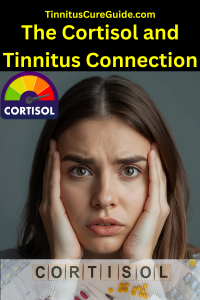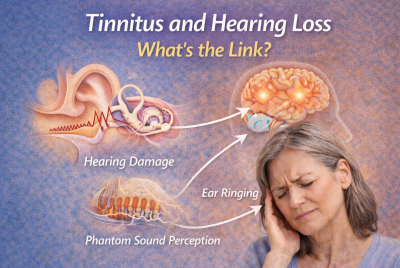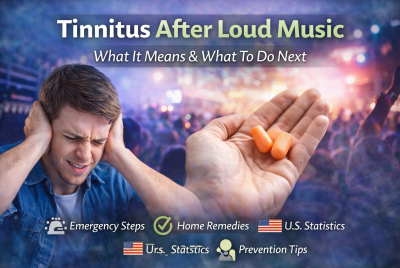The Cortisol and Tinnitus Connection: How Stress Hormones Influence Ringing in the Ears
Why Stress Makes Tinnitus Worse
If you live with constant ringing, buzzing, or whooshing sounds in your ears, you already know how disruptive tinnitus can be. But did you know that your body’s stress hormone, cortisol, may be playing a major role in those flare-ups? Many people notice that tinnitus symptoms spike during periods of high stress or anxiety. This article explores the cortisol and tinnitus connection, why stress hormones may worsen ear ringing, and what you can do to calm both your mind and your ears.
Understanding the Cortisol and Tinnitus Connection
Cortisol is often called the “stress hormone.” Your adrenal glands release it when you face a challenging situation, whether it’s rushing to meet a deadline or dealing with emotional stress. While cortisol helps the body respond to short-term stress, long-term high levels can cause health issues — and tinnitus may be one of them.
Does High Cortisol Cause Ear Ringing?
Research suggests that elevated cortisol may affect blood flow, nervous system activity, and inner ear function, all of which can trigger or worsen tinnitus symptoms. While cortisol itself may not directly cause tinnitus, it can increase sensitivity in the auditory system, making ringing or buzzing more noticeable.
Stress Hormones and Constant Ear Ringing
Many tinnitus sufferers report that their symptoms worsen during stressful life events. This is because stress hormones — including cortisol and adrenaline — heighten the body’s “fight or flight” response.
-
Increased blood pressure: Narrower blood vessels can reduce oxygen supply to the inner ear.
-
Overactive nervous system: Heightened nerve activity can make sounds seem louder.
-
Sleep disruption: Poor sleep from stress raises cortisol even more, creating a vicious cycle.
This explains why people often experience ear buzzing sound during anxious periods or after long nights of poor rest.
Cortisol Levels and Tinnitus Symptoms Explained
Let’s break down how cortisol affects tinnitus step by step:
-
Stressful trigger (work, emotional stress, health worries)
-
Cortisol release raises alertness and tension
-
Increased nerve activity in the auditory pathway
-
Perception of louder ear ringing or new sounds like whooshing in ears
For many people, tinnitus becomes most noticeable during morning cortisol spikes, when hormone levels are naturally higher. That’s why you might wake up to louder ringing in your ears.
Cortisol, Anxiety, and Ear Buzzing Sound
Anxiety and tinnitus often go hand in hand. Anxiety raises cortisol, and tinnitus makes anxiety worse — creating a frustrating loop.
-
Anxiety → More cortisol → Louder tinnitus
-
Louder tinnitus → More anxiety → More cortisol
Breaking this cycle requires managing both cortisol and anxiety levels. Practices like mindfulness, deep breathing, and guided relaxation can help you take back control.
Morning Cortisol Spikes and Tinnitus Flare-Ups
Cortisol naturally peaks in the morning to help you wake up. For tinnitus sufferers, this can mean waking to an intense ringing or buzzing sound. Common signs include:
-
Ringing that feels louder right after waking
-
Difficulty focusing in the morning
-
Relief later in the day as cortisol levels drop
If this sounds familiar, creating a calming morning routine — including stretching, hydration, and avoiding caffeine right away — may ease the intensity of morning tinnitus flare-ups.
Stress Hormone Imbalance and Whooshing in Ears
Not all tinnitus is the classic high-pitched ringing. For many people, stress can trigger a whooshing, thumping, or pulsing sound in the ears — sometimes described as hearing your own heartbeat. This is often linked to pulsatile tinnitus, which is different from the constant ringing most people associate with tinnitus.
How Stress Hormones Affect Circulation in the Ear
When cortisol and adrenaline stay elevated for too long, they can:
-
Increase blood pressure – Stress hormones narrow blood vessels, forcing the heart to pump harder. This makes the rushing of blood more noticeable near the inner ear.
-
Affects blood vessel flexibility – Chronic stress can make blood vessels stiffer, which may amplify pulsatile tinnitus or whooshing sounds.
-
Trigger nervous system sensitivity – Stress hormones overstimulate the auditory nerves, making internal sounds (like blood flow) harder to tune out.
This explains why people often notice whooshing in ears after stressful days or during periods of high anxiety.
Common Triggers for Stress-Related Whooshing
-
Morning cortisol spikes (especially if combined with high blood pressure)
-
Caffeine or alcohol, which raises stress hormones further
-
Lack of sleep, which disrupts cortisol regulation
-
Long-term stress that leads to a hormonal imbalance
Practical Tips to Reduce Whooshing Tinnitus from Stress
-
Practice stress management daily: Deep breathing, meditation, or progressive muscle relaxation can calm cortisol levels.
-
Monitor blood pressure: Even mild elevations can worsen pulsatile tinnitus; regular checks help you spot issues early.
-
Stay hydrated: Dehydration thickens blood and may intensify the pulsing sound.
-
Cut back on stimulants: Reducing coffee, nicotine, and energy drinks can help lower cortisol and blood pressure.
-
Gentle exercise: Walking, yoga, and tai chi improve circulation and help regulate stress hormones.
If you consistently hear a whooshing sound in time with your heartbeat, it’s important to consult a doctor. While stress can play a major role, pulsatile tinnitus can sometimes be linked to treatable vascular conditions, ear infections, or other medical issues that require evaluation.
How Stress Hormones Trigger Whooshing in Ears
Stressful Event (work, anxiety, lack of sleep)
↓
Cortisol + Adrenaline Spike (stress hormones rise)
↓
Blood Vessel Changes (narrowing + higher blood pressure)
↓
Increased Blood Flow Near the Inner Ear
↓
Brain Perceives “Whooshing” or Pulsatile Tinnitus
How to Reduce Cortisol for Tinnitus Relief
Managing cortisol is a key step toward reducing tinnitus intensity. Here are science-backed approaches:
Natural Ways to Lower Cortisol and Tinnitus
-
Mindfulness meditation – Lowers stress hormone production.
-
Daily exercise – such as walking, yoga, or swimming- helps regulate cortisol levels.
-
Balanced diet – Reduce sugar and processed foods; add magnesium and omega-3s.
-
Adequate sleep – Consistent 7–9 hours lowers stress response.
-
Limit caffeine and alcohol – Both can spike cortisol and worsen ear ringing.
Supplements and Medical Options
-
Magnesium: Helps calm nerve activity in the auditory system.
-
Ashwagandha: An adaptogenic herb shown to regulate cortisol.
-
B vitamins: Support nerve health and reduce stress fatigue.
-
Medical care: Doctors may recommend cognitive behavioral therapy (CBT), anti-anxiety medication, or tinnitus retraining therapy if symptoms are severe.
Real-Life Coping Strategies for Tinnitus and Stress
-
Sound therapy apps: Use white noise or ocean sounds to mask ringing.
-
Journaling: Writing down worries reduces mental stress.
-
Support groups: Talking with others who understand can reduce emotional load.
-
Breathing techniques: 4-7-8 breathing helps calm the nervous system.
These strategies won’t cure tinnitus, but they can make it much more manageable when stress hormones spike.
When to See a Doctor
While stress and cortisol play a major role in tinnitus, sometimes ear ringing signals an underlying medical condition. Contact a doctor if you notice:
-
Sudden onset of tinnitus in one ear
-
Tinnitus with dizziness or hearing loss
-
Pulsatile tinnitus (whooshing in rhythm with heartbeat)
-
Severe anxiety, depression, or insomnia caused by tinnitus
Your doctor may recommend a hearing exam, blood pressure check, or referral to an ear specialist.
FAQs About the Cortisol and Tinnitus Connection
1. What is the cortisol and tinnitus connection?
The cortisol and tinnitus connection refers to how elevated stress hormones, especially cortisol, can amplify ringing, buzzing, or whooshing in the ears. High cortisol increases nerve sensitivity and blood flow changes, making tinnitus symptoms more noticeable during stressful periods.
2. Does high cortisol cause ear ringing?
High cortisol doesn’t directly cause tinnitus but can worsen it. Stress hormones increase auditory nerve sensitivity and alter circulation in the inner ear, which often makes ear ringing, buzzing, or whooshing sound louder during stressful or anxious situations.
3. How do stress hormones affect constant ear ringing?
Stress hormones like cortisol and adrenaline heighten nervous system activity and increase blood pressure. This combination makes constant ear ringing more noticeable, particularly during periods of prolonged stress, anxiety, or poor sleep, creating a feedback loop that worsens tinnitus.
4. Can reducing cortisol help with tinnitus relief?
Yes. Lowering cortisol through lifestyle changes, mindfulness, exercise, and proper sleep can calm the nervous system and reduce tinnitus flare-ups. Stress management often helps ease ear ringing intensity, especially in people sensitive to cortisol spikes.
5. Why does tinnitus worsen in the morning?
Tinnitus can worsen in the morning due to natural cortisol spikes that occur shortly after waking. Elevated stress hormones increase nerve and blood flow activity in the inner ear, making ringing, buzzing, or whooshing sounds more noticeable during early hours.
6. When should I see a doctor for stress-related tinnitus?
See a doctor if tinnitus is sudden, one-sided, accompanied by dizziness, hearing loss, or pulsatile whooshing. Professional evaluation ensures there’s no underlying medical condition while guiding stress and cortisol management for better tinnitus control.
7. What natural ways lower cortisol for tinnitus relief?
Effective natural methods include meditation, yoga, regular exercise, balanced nutrition, quality sleep, and reducing caffeine or alcohol. Adaptogenic supplements like Quietum Plus, ashwagandha, magnesium, and omega-3s may also help regulate cortisol and ease tinnitus symptoms naturally.
Conclusion: Taking Control of Stress and Tinnitus
The cortisol and tinnitus connection is clear — high stress hormone levels can make ringing, buzzing, or whooshing in the ears worse. The good news is that lowering cortisol through lifestyle changes, mindfulness, and medical support can help reduce symptoms and improve quality of life. By managing stress, you’re not only protecting your overall health but also taking a powerful step toward calmer, quieter days.
Disclaimer
This article is for informational purposes only and is not a substitute for professional medical advice. Always consult with a qualified healthcare provider before making changes to your treatment or lifestyle.

- Tinnitus Retraining Therapy Reviews
- Neck Tightness Causing Ear Ringing
- Nicotine Tinnitus Risk Factor






